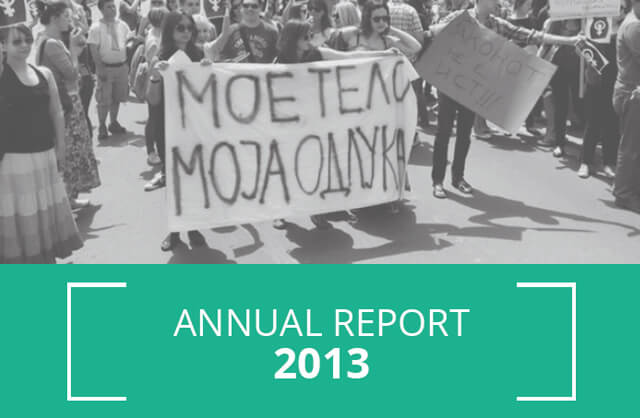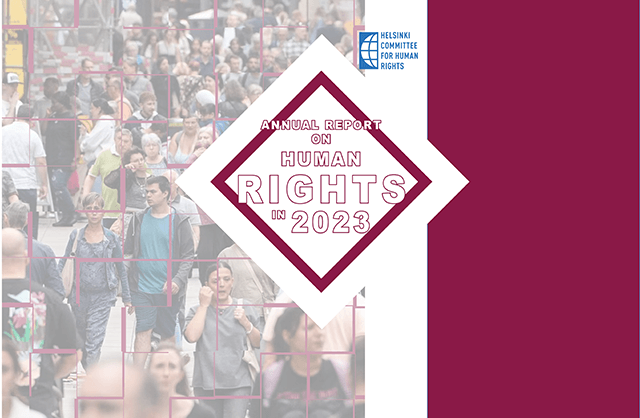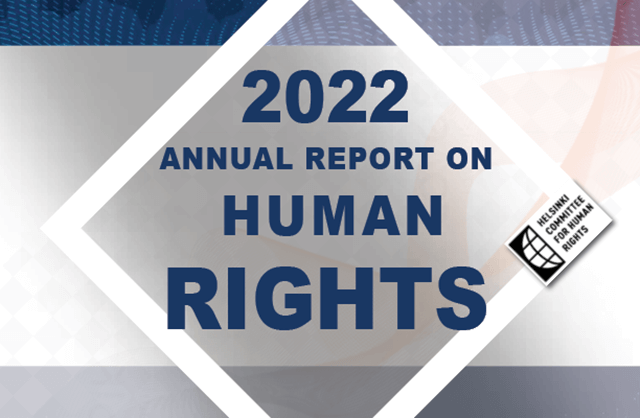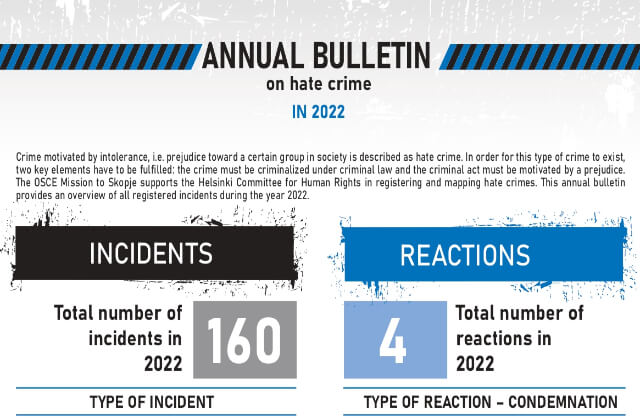Annual report on human rights in 2013
May 28, 2014

The report for 2013 is a summary of the work of the Committee throughout the year in terms of monitoring human rights and freedoms, which are also reported in the monthly reports. The assessment is that in 2013, as well as in the previous few years, serious violations of the freedoms and the rights of the citizens and drastic violations of the rule of law and the legal state were ascertained. What is particularly worrying is that the registered violations of human rights and freedoms indicate not only systemic problems in the functioning of the bodies and institutions but also abuse of their competencies. The Annual report is a sublimate analysis of the identified human rights situation in the following areas: judiciary, legislation, police conduct, closed institutions, discrimination, hate crimes, economic and social rights, the rights of the child, civil and political rights and freedoms, LGBTI community.
The following systemic inconsistencies have been identified from the work of the Committee as an observer of court proceedings: violation of the presumption of innocence; the practice of adopting collective, identical, and stereotyped decisions on detention; non-disclosure of the composition of the judicial council; non-compliance with the decisions of the President of the Supreme Court for recording the main hearings; exclusion of the public during the interrogation of endangered/protected witness and exceeding the deadlines for drafting verdicts; violation of the right to a trial within a reasonable time; exceeding the deadlines for publication and drafting of verdicts. The Helsinki Committee of the Republic of Macedonia singles out the case of Martin Neshkovski due to ineffective investigation of the murder by the police and the Public Prosecutor’s Office and due to the refusal of the courts to conduct court proceeding. For that reason, the Helsinki Committee filed an appeal to the European Court of Human Rights. From the aspect of the initiatives to the Constitutional Court and its decisions, the Helsinki Committee of the Republic of Macedonia regretfully concludes that the work of the Court violates the principle of separation of powers and violates the independence of the judicial system from the executive power. Namely, the Constitutional Court decided not to initiate a procedure for assessing the so-called Lustration law, which gave legitimacy to undoubtedly the most unconstitutional law ever adopted in Macedonia.
Тhe Helsinki Committee emphasizes the excessive use of the urgent procedure and exclusion of the professional public, especially in cases when the proposed laws are insufficiently developed and contain too many novelties. This is the case with the Law on Bar Exam in which the used solutions do not correspond to the Macedonian legal system. On that line of criticism towards the process of adopting laws by urgent procedure, the adoption of the Law on Termination of Pregnancy stands out.
With regard to the closed institutions, it is important to be noted that the detention and the decisions for extending detention are sometimes used as punishment or as a method of intimidation. As an example, we would like to point out the case “Snake Eye” (Zmisko oko), in which the Helsinki Committee for Human Rights represented the defendants before the Court in Strasbourg, where this Macedonian practice was characterized as contrary to the European Convention on Human Rights.
According to the received complaints, the Helsinki Committee concludes that during 2013, the most prevalent discrimination was the discrimination on the grounds of political affiliation, ethnicity to the Roma community, and sexual orientation. During 2013, the Helsinki Committee for Human Rights recorded 116 hate crimes. About 84% of the hate crimes occurred because of the victim’s different ethnicity. Last year, the hate crimes in which sexual orientation and gender identity appeared as motives were second on the list of reported cases and statistics kept by the Helsinki Committee for Human Rights. But despite the homophobic violence in several cases, the institutions failed to respond appropriately. It is additionally aggravating that sexual orientation and/or gender identity are not explicitly provided as grounds for discrimination. They are not even indirectly provided as grounds in the Law on Prevention and Protection against Discrimination. Furthermore, the courts and the Commission for Protection against Discrimination do not consider them as grounds for discrimination, even though that is required by the European law in this area.
The Helsinki Committee did not find any progress in the area of economic and social rights, although the public gets the impression that they are being promoted, especially in the area of social protection, the right to employment, and the right to health care. With regard to the freedom of assembly and association and the freedom of expression through the form of protest or public assembly, the Committee observed several protests in which the police reacted untimely or unprofessionally and identified violations or attempts to obstruct a public assembly, pointing to the practice of restricting the constitutionally guaranteed right to protest.


